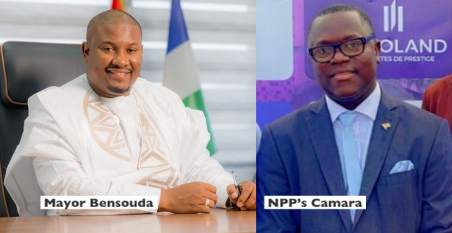The Perils Of Trying Too Hard: A Critique Of Sulayman Camara’s Misguided Criticisms

Mayor Talib Ahmed Bensouda of KMC and Sulayman Camara Media and Communications Secretary NPP
By Ousman Ceesay, Seattle, WA
In the tumultuous realm of politics, where voices clash and ideologies collide, individuals often find themselves caught in the delicate balance between fitting in and standing out. The age-old adage attributed to Criss Jami, “Whether you try too hard to fit in or you try too hard to stand out, it is of equal consequence: you exhaust your significance,” resonates profoundly in the context of Sulayman Camara’s recent critique of Mayor Talib Bensouda’s speech commemorating the 59th anniversary of the Gambia’s Independence.
Camara, the Media and Communications representative for the National People’s Party, embarked on a misguided endeavor to discredit Mayor Bensouda’s address. He lamented what he perceived as the Mayor’s failure to pay homage to the founding fathers, revealing a shallow understanding of the essence of commemoration. Contrary to Camara’s assertion, fealty to the founding fathers is not a prerequisite for acknowledging a nation’s progress since its inception. Mayor Bensouda astutely chose to assess the socio-economic challenges plaguing the nation, a hallmark of thoughtful leadership. Identifying and addressing these challenges is imperative for national growth, a fact overlooked by Camara in his quest for visibility and conformity.
Furthermore, Camara’s attempt to attribute the nation’s woes solely to external factors such as the global economic crisis and geopolitical tensions reflects a glaring lack of accountability. While acknowledging the impact of these factors, effective governance entails proactive measures to mitigate their effects. Camara’s readiness to shift blame instead of advocating for tangible solutions epitomizes the perils of trying too hard to fit into a narrative of convenience.
Central to Camara’s criticism is the issue of Gambian youth emigration, a pressing concern demanding urgent attention. However, Camara’s scapegoating of Mayor Bensouda and the Kanifing Municipal Council overlooks the broader systemic issues at play. Emigration is a multifaceted issue requiring comprehensive national strategies, beyond the purview of municipal governance. Mayor Bensouda’s efforts to highlight this issue serve to catalyze meaningful discourse and action at the national level, a role Camara fails to grasp in his pursuit of political relevance.
Moreover, Camara’s disparagement of Mayor Bensouda’s initiatives, such as the Mbalit project and beautification efforts, reeks of hypocrisy and shortsightedness. The Mbalit project exemplifies Mayor Bensouda’s commitment to improving public health and sanitation, fundamental components of societal well-being. Similarly, the beautification of public spaces demonstrates a dedication to enhancing the quality of life for citizens, a principle Camara conveniently disregards in his attempt to discredit the Mayor.
In conclusion, Sulayman Camara’s misguided criticisms of Mayor Talib Bensouda’s leadership underscore the dangers of trying too hard to conform to partisan agendas and shallow narratives. His failure to recognize the nuanced complexities of governance and his propensity to deflect accountability epitomize the erosion of significance that accompanies such endeavors. As a nation, we must eschew the allure of conformity and embrace the courage to stand out, advocating for genuine progress and meaningful change. Only then can we truly transcend the limitations of fitting in and realize our collective potential.

